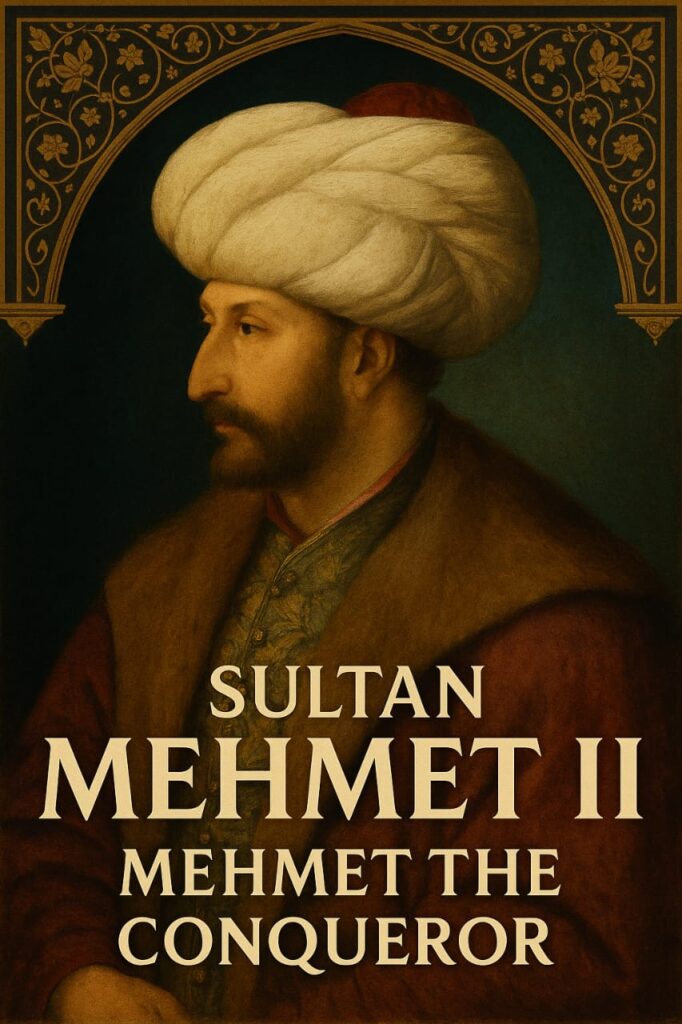Introduction: A Dream Born in Silence
A little child would frequently look at maps in the silent hallways of the Ottoman palace at Edirne with a look of intense resolve in his eyes. He was imagining a future rather than merely seeing the land. That youngster was Mehmet II, and the capture of Constantinople was his goal, a desire that nations had sought for millennia. He didn’t just dream it, unlike others. He succeeded.
The Odyssey is more than just a monarch’s tale. It tells the story of a youngster who grew up to become the man who changed the world, Mehmet the Conqueror.
The Burden of a Young Sultan

Mehmet, who was born on March 30, 1432, to Sultan Murad II, was thrust at an early age into the maelstrom of palace politics, diplomacy, and combat. At the age of twelve, when most boys were still learning how to wield a sword rather than rule a kingdom, he came to the throne.
Consider the weight of a child who is supposed to sustain an entire empire. Mehmet, however, was not your typical person. He was intensely analytical, ferocious, and concentrated. Political pressure caused him to momentarily relinquish the crown to his father, but he came back stronger. His resolve only grew stronger with each failure.
A Dream City: Constantinople
There was more to Constantinople than just a city. The centre of the Byzantine Empire, which remained unaffected for more than a millennium, served as a symbol. Attempts by emperors had failed. The armies had fallen and bled. Mehmet had a different perspective. He saw more than just walls; he saw a chance to bring East and West together and create a new global order.
With an army of nearly 100,000 soldiers and enormous guns, including the fabled Basilica, Mehmet began one of the most complex sieges in history in 1453. His warriors fought ceaselessly for 53 days. Everyone on the planet was silent.
Then the unthinkable occurred on May 29, 1453, the fall of Constantinople.
Across continents, the sound of the Ottoman flag being raised over the city reverberated. Mehmet arrived in the city with honour rather than devastation. He kept the peace, protected the churches, and turned Constantinople into Istanbul, the bustling hub of a new empire.
The Soul Behind the Sword
Sultan Mehmet II was remarkable for more reasons than only his military prowess. It was his character depth.
He composed poetry under the pen name Avni. He was fluent in Greek, Latin, Hebrew, Arabic, Persian, and Turkish. He adored the arts, philosophy, and science. He was a ruler who valued tolerance, a fighter with insight, and a conqueror with compassion. During his reign, Christians, Jews, and Muslims coexisted together, which is uncommon in a divided society.
At one point, he said:
“To be merciful is to be just. And having mercy is a sign of strength.
Building an Empire of the Mind and Spirit
After conquering Constantinople, Mehmet didn’t stop. He reformed the law, built majestic architecture, and promoted education. He turned Istanbul into a centre of civilisation, inviting scholars, architects, and thinkers from around the world.
His reign wasn’t just about expanding borders — it was about expanding horizons.
The Final March
Sultan Mehmet II became ill and died in 1481 when he was getting ready for yet another military expedition, the origin of which is still unknown. He was just forty-nine.
The entire empire was rocked by his demise. Istanbul’s streets were filled with tears. The world had changed.
However, Sultan Mehmet had already made his name legendary. He was more than just a ruler. He was a creator of history, a dreamer, and a visionary.